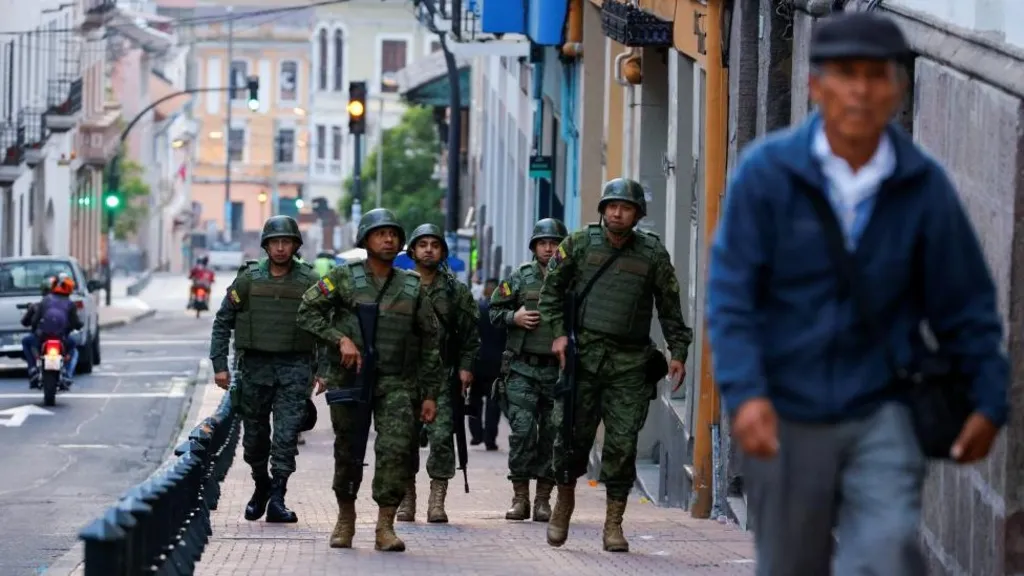Ecuador's Juvenile Hitmen
"We want minors to stop being the preferred labour force of organized crime.""Today it's cheaper to hire them, and the penalties are laughable. So we propose that, in serious crimes such as murder, they receive the penalty of an adult, although they serve it in a [special] correctional facility until they are 18."Vincente Taiano, National Assembly of Ecuador"It shocked me to see children nine or ten years old with rifles, learning to shoot. It's an image you can't easily forget.""I spoke with children who had killed dozens of people as part of their training. They were willing to do it for ten or 20 dollars.""They called their victims 'breasts' because they're worth what a chicken costs."Monica Velasquez, journalist, independent digital media LaPosta
 |
| Soldiers have been deployed to boost security Reuters |
A
documentary produced by Monica Velasquez in 2021 reported the
phenomenon of 'hitman schools'. Her documentary revealed footage of
armed instruction given to youths with criminal aspirations. These
schools take place on the streets of Duran, in Ecuador. The city became
the world homicide capital in 2023. Child involvement in crime is of
such a magnitude that Ecuador's own statistics reveal that the leading
cause of death among minors in the country is murder.
Because
of her activist revelations, Ms. Velasquez was under constant threat of
violence, convincing her that to preserve her life it was necessary to
leave her country. She now lives, a refugee from Ecuador, in Canada.
Organized crime groups' threats hounded her from Ecuador. She must now,
as it happens, recognize that in Canada too -- not yet at the extent
seen in Ecuador -- organized crime recruits adolescents to work with the
group in drug trafficking and vehicle thefts; stolen for export abroad.
There
were 6,964 homicides in Ecuador last year, reflective of the incidence
of violent crime in the country. Of those homicides, many were at the
hands of armed and trained teens embroiled in violence through organized
crime. The South American country is now considered one of the most
dangerous places in the world. Last spring a murder occurred that
shocked even the most blase Ecuadorians accustomed to reading about
criminal events in their country.
A
14-year-old boy was revealed in a brief video, seated on a bus, pulling
a firearm out of his backpack, then threatening the bus driver, to
extract money from him. The bus driver's young daughter happened to be
seated beside her father and appealed to the boy to take the money and
leave. From the bus steps as the boy was exiting, he suddenly turned and
shot point blank at the driver's head, killing him instantly.
Someone
like that 14-year-old committing a crime of that dimension under
Ecuadorian law would receive no more than eight years of confinement in a
juvenile court if he was convicted of the crime. With time off for good
behaviour his sentence could be halved. There is a moral/justice
dilemma for Ecuador to solve for itself in the face of these blatant,
frequent crimes committed by children.

Violence
in the country is out of hand. Six of every ten members of local
cartels are minors, according to a 2024 report by the Konrad Adenauer
Foundation in Germany. The National Assembly of Ecuador is grappling
with the dilemma of what can be done. Following the bus murder, Vicente
Taiano, a conservative legislator, called for a debate too long in
coming to address the critical and dangerous issues before it, of child
violence associated with gang memberships.
It
is now up to the National Assembly to reach a consensus of how the
issue can be addressed. It has been under discussion for months, with no
forward movement. Under Ecuadorian law the age of criminal
responsibility -- the lowest in the region -- is 12 years. However, says
Parliamentarian Taiano, the penalties are "very soft". He then proposed
a toughening of the criminal law, citing: adult crime, adult penalty.
Pierina
Correa, president of the Legislative Commission for Children's Rights
accuses the prospective change in youth criminal law proponents of being
"penal populists".
It is her opinion that children in Ecuador, while not exempt from
prosecution, must also be recognized as requiring more guidance.
"They are not turning to organized crime because they have a criminal
vocation, but because the state has failed them in every way", she accuses.
Argentina
and Peru also are in discussion respecting how they might address a
similar social legal problem. Sweden, considered a developed country,
found the number of children taking part in blood crimes there had
tripled in 2024. The difference is that none of these countries have
seen 'hitman schools' tutoring children in weaponry handling and
financial incentives to commit violence, including killing people.
And
then, in Ecuador another complicating factor has emerged. The internal
armed conflict with the state declaring war on drug trafficking cartels
has seen the military enlisted in the war on drug trafficking cartels. A
military patrol of 16 soldiers had detained four children in Ecuador's
south back in December. The children's bodies were found weeks later,
mutilated and charred. The soldiers stand accused of forced
disappearance.
 |
Labels: Drug Trafficking, Ecuador, Gang Violence, Homicide Capital, Juvenile Hitmen
0 Comments:
Post a Comment
<< Home